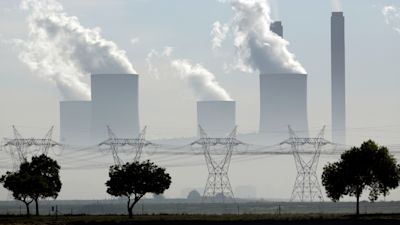COP26: UK, US and EU pledge £6.2 billion fund to help South Africa ditch coal

The UK, US, Germany and France have teamed up in a first-of-its-kind multi-billion pound partnership to speed up South Africa's transition to a greener economy.
An initial £6.24 billion ($8.5 billion) has been pledged by the countries, along with the EU, to help South Africa ditch coal - its main power source.
It is thought the initiative will prevent up to 1.5 gigatonnes of emissions over the next two decades by providing grants and loans over a five-year period, Downing Street said.
The funds will help the nation move away from coal-fired plants which generate around 90% of the country's energy and help South Africa achieve climate targets set out in its Nationally Determined Contributions plan.
Leaders hope the Just Energy Transition Partnership will act as a blueprint for other nations with Boris Johnson describing it as "game-changing".
The prime minister said he hoped it would "set a precedent for how countries can work together" to tackle climate change by "choking off international finance for coal".
South Africa President Cyril Ramaphosa said: "We look forward to a long term partnership that can serve as an appropriate model of support for climate action from developed to developing countries, recognising the importance of a just transition to a low carbon, climate resilient society that promotes employment and livelihoods."
South Africa is the world's 12th biggest emitter of harmful greenhouse gases, largely due to its heavy reliance on coal power.
Phasing out coal is a complex task as it is embedded in the nation's economy and society - the industry provides tens of thousands of jobs in a country where unemployment stands at 35%.
The partnership said it "recognises the importance" of supporting South Africa's mining communities and workers and will help to provide new green jobs, while rolling out renewable energy industries.
Jesse Burton, an energy policy researcher for climate think tank E3G, described the initiative as a "big deal" - but highlighted some of the potential issues ahead.
She tweeted: "Phasing out coal in a way that doesn’t exacerbate existing fragility is South Africa’s most pressing challenge...
"SA's most pressing need is for just transition for workers & communities where plants & mines are already closing & where coal mining & use has left ecological degradation that limits alternative opportunities".
In recent days, people living close to coal mines and power stations in South Africa told ITV News they are suffering with health issues and that they felt trapped in a dying community with nowhere to go.
One environmentalist told ITV News Senior International Correspondent John Irvine: "It's like living in hell... our kids are struggling, they are sick."
Another concern highlighted is that South African utility giant Eskom, which provides 97% of the country’s electricity and labelled the world's most polluting power company, is in debt of $27 billion (£20 billion).
Ms Burton highlighted that Eskom's financial crisis means it cannot fund a shift to greener energy and is therefore "preventing the roll out of new renewables in areas with the best resources".
She said it was "critical that this blockage is addressed" to make sure renewable industries can be introduced - but "overall, this is an exciting start", she said.